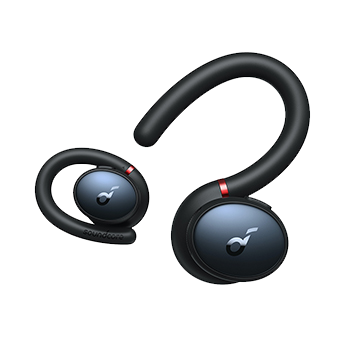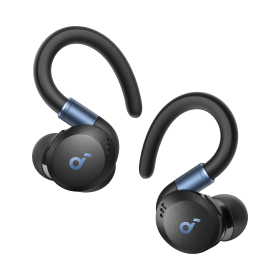Can Noise Cancelling Headphones Cause Tinnitus? Final Answer
In the fast-paced world, we're increasingly bothered by various noises, which stimulates the growing demand for noise-cancelling headphones. These headphones offer a respite from the constant barrage of environmental noise, providing a more immersive and peaceful listening experience. However, concerns arise regarding whether do noise cancelling headphones cause tinnitus, a condition characterized by perceiving sounds that do not originate from an external source. In this article, we will explore whether can noise cancelling headphones cause tinnitus and explore strategies for preventing tinnitus including using the best ANC earbuds for tinnitus relief. Without further ado, let's dive in.

What is Tinnitus?
Tinnitus is a condition that manifests as persistent ringing, buzzing, hissing, or other phantom sounds in the ears, not associated with any external stimuli. It affects approximately 30% of people during their lifetime and can be temporary or chronic.
According to studies, tinnitus often results from damage to the microscopic hair cells within the inner ear, exposure to loud noises, or underlying medical conditions. Moreover, prolonged exposure to high volumes and loud noises, including through headphone use, may also contribute to the development or exacerbation of tinnitus.
Can Noise-Cancelling Headphones Cause Tinnitus?
Noise-cancelling headphones themselves do not cause tinnitus unless you always listen at high volume. As we talked about before, tinnitus is mainly caused by damage to the small hairs inside our ears, long exposure to loud noise, or underlying medical issues. Therefore, the idea of tinnitus from headphones makes no sense even though some individuals have reported that the extreme quietness induced by noise-cancelling headphones can amplify their perception of tinnitus.
In fact, this occurs because our ears are not accustomed to absolute silence, and the absence of ambient noise can make tinnitus more noticeable, while the active soundwave cancellation technology can create better sound isolation, potentially making wearers more aware of pre-existing or heightened phantom sounds associated with tinnitus.

How to Prevent Tinnitus?
Preventing tinnitus requires adopting healthy habits and minimizing exposure to potential triggers. Some effective preventive measures include:
Limit time spent around loud sounds
Even seemingly moderate sounds, when experienced for prolonged periods, can contribute to tinnitus. Be mindful of the decibel levels and try to keep the volume below 60% to protect your hearing. Besides, giving your ears regular breaks from prolonged exposure to loud noises, including music or other audio can reduce the risk of developing tinnitus.
Use caution with earbuds
To protect yourself from hearing loss and tinnitus, set your headphones or earbuds to lower volumes. Noise-cancelling headphones are a good option as they help dampen external noises, allowing you to listen at lower volumes. A helpful tip is to conduct a volume test with a friend standing next to you. If they can hear sound from your earbuds or headphones, the volume is too high.
Wear hearing protection
When exposed to loud environments, such as concerts, sporting events, or construction sites, wearing hearing protection, such as earplugs or earmuffs, can safeguard your ears from potential damage.
Protect your overall health
Maintaining a healthy lifestyle can contribute to preventing tinnitus. Take care of your cardiovascular health as disorders of the blood vessels can lead to tinnitus. Engage in regular exercise, eat a balanced diet, and manage conditions like high blood pressure and diabetes, as they can increase the risk of tinnitus. By prioritizing your overall health, you may also reduce the need for certain medications that can cause tinnitus.
Manage stress
Stress can exacerbate tinnitus symptoms, so it's important to find ways to manage and reduce stress levels. Incorporate relaxation techniques into your daily routine, such as meditation, yoga, deep breathing exercises, or engaging in activities you enjoy. Building a support system and spending time with loved ones can also help alleviate stress. By effectively managing stress, you can potentially lessen the impact of tinnitus and improve your overall well-being.
Best ANC Earbuds to Help with Tinnitus - soundcore Liberty 4 Pro

The soundcore Liberty 4 Pro offers advanced noise-cancelling features and superior sound quality, helping to create a more comfortable listening environment for those with tinnitus.
Its Adaptive ANC 3.0 technology adjusts the noise cancellation every 1/3 second, providing a personalized noise reduction experience. This helps minimize exposure to loud environments that might aggravate the condition. Better still, the dual-driver acoustic architecture ensures a balanced and high-quality audio experience, which can make listening more comfortable for those with sensitive hearing.
Furthermore, these best earbuds for tinnitus offer easy controls with the touch bar and smart screen, allowing you to easily switch between noise-cancelling and transparency modes. With up to 10 hours of playtime on a single charge and a quick 5-minute charge providing 4 hours of playback, these earbuds present convenience and long-lasting use, helping you maintain a controlled audio environment throughout the day.
Conclusion
Now that you know whether can earbuds cause tinnitus and don't worry about any concerns like do Bluetooth headphones cause cancer or tinnitus. Noise cancelling headphones themselves do not cause tinnitus. However, prolonged exposure to loud volumes and noises can contribute to the development or worsening of tinnitus. So it's important to adopt preventive measures to protect your hearing and minimize the risk of tinnitus. By limiting time spent around loud sounds, wearing hearing protection in noisy environments, maintaining a healthy lifestyle, managing stress, and choosing the best ANC earbuds or headphones, you can help reduce the likelihood of developing tinnitus and enjoy a more peaceful and enjoyable audio experience while protecting your hearing health.
FAQ
How does noise cancelling work?
The noise cancelling technology mainly includes passive and active noise cancellation which may function in a different way. Passive noise cancelling works by physically blocking external noise through the design and materials of the headphones or earbuds. While active noise cancellation functions by using built-in microphones to capture external sounds and then generates an inverse sound wave to cancel out the incoming noise. Both can provide a quieter environment for the wearer in different situations.
How to use noise cancelling earbuds with tinnitus?
Managing tinnitus while using noise-cancelling earbuds requires a personalized approach. Here are some tips to consider:
Consult with a Healthcare Professional:
If you have tinnitus or any concerns about its impact on your hearing, please seek guidance from a healthcare professional who can provide personalized recommendations and advice based on your specific situation.
Use the Right Fit and Comfort:
When using noise cancelling earbuds, a proper fit and comfortable seal helps enhance the effectiveness of noise cancellation while providing comfort for extended use.
Moderate Volume Levels:
Avoid excessively high volume levels when using noise cancelling earbuds. Listening at a moderate volume not only protects your hearing but also allows the ANC technology to work optimally.
Consider Ambient Sound Options:
For those who find complete silence distracting or prefer a degree of environmental awareness while listening, it may be beneficial to selectively hear some external sounds by using the ambient sound mode.





























































